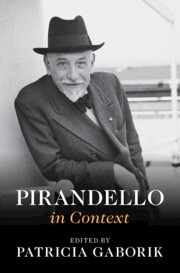Book contents
- Pirandello in Context
- Pirandello in Context
- Copyright page
- Dedication
- Contents
- Figures
- Contributors
- Preface
- Acknowledgments
- Chronology
- List of Cited Titles in Translation and the Original Italian
- Part I Places
- Part II Institutions
- Part III Interlocutors
- Part IV Traditions and Trends, Techniques and Forms
- Chapter 18 Humor
- Chapter 19 Dialect Theatre
- Chapter 20 Metatheatre
- Chapter 21 The Fourth Wall
- Chapter 22 The Anti-Character
- Chapter 23 Myth
- Chapter 24 The Fantastic
- Part V Culture and Society
- Part VI Reception and Legacy
- Further Reading
- Index
Chapter 22 - The Anti-Character
from Part IV - Traditions and Trends, Techniques and Forms
Published online by Cambridge University Press: 14 March 2024
- Pirandello in Context
- Pirandello in Context
- Copyright page
- Dedication
- Contents
- Figures
- Contributors
- Preface
- Acknowledgments
- Chronology
- List of Cited Titles in Translation and the Original Italian
- Part I Places
- Part II Institutions
- Part III Interlocutors
- Part IV Traditions and Trends, Techniques and Forms
- Chapter 18 Humor
- Chapter 19 Dialect Theatre
- Chapter 20 Metatheatre
- Chapter 21 The Fourth Wall
- Chapter 22 The Anti-Character
- Chapter 23 Myth
- Chapter 24 The Fantastic
- Part V Culture and Society
- Part VI Reception and Legacy
- Further Reading
- Index
Summary
The chapter locates Pirandello’s characters against the backdrop of modernist culture. Beginning with Baudelaire, Rimbaud, and Nietzsche’s reflections on the multiple nature of the “I,” Pirandello’s construction of his characters proves fully in tune with contemporary developments in European thinking. When dealing with such fictional characters as Mattia Pascal and Vitangelo Moscarda, Pirandello goes for an anti-heroic approach to their relationship with history as opposed to nineteenth-century Romantic heroism. Theatre characters, on the other hand, escape definitions and roles to the extent that they become Nobody, following in the footsteps of Dostoevsky, Binet, and Blondel’s reflections on psychology and freedom.
- Type
- Chapter
- Information
- Pirandello in Context , pp. 179 - 186Publisher: Cambridge University PressPrint publication year: 2024

